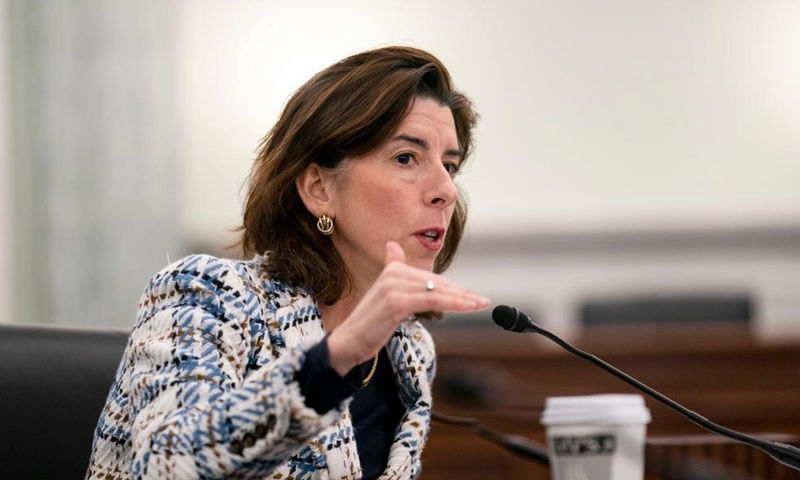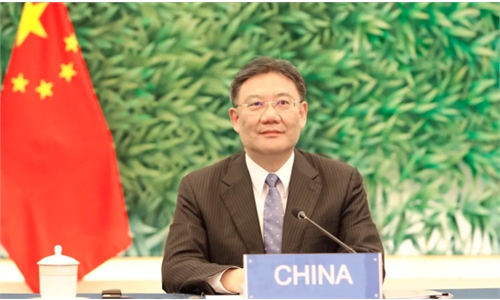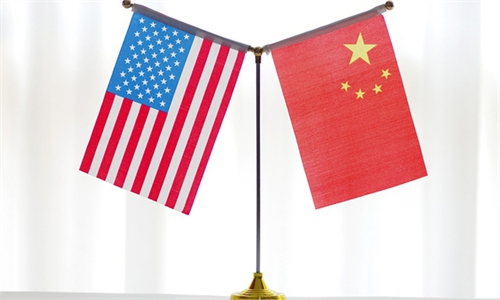Raimondo’s visit a ‘litmus test’ for US sincerity; China likely to express its biggest concern through the dialogue: experts
Cooperation in economy & trade a ‘ballast stone’ of ties; pursuing decoupling will lead to isolation

U.S. Commerce Secretary Gina Raimondo. (Xinhua/Liu Jie)
Ahead of US Secretary of Commerce Gina Raimondo's visit to China, the US has sent a series of positive signals, from the removal of 27 Chinese entities from its unverified list, to remarks like "the US is not seeking to decouple from China" made by US national security adviser Jake Sullivan, as well as Raimondo's "productive" discussion with Xie Feng, Chinese Ambassador to the US.Chinese experts viewed Raimondo's upcoming China trip as a "litmus test" to see whether the US is sincere in fixing bilateral relations. Some experts said that China does not expect a single visit can solve all the problems in bilateral ties, but if the two sides can reach some consensus in practical areas, so as to lay a foundation for further negotiations, it would be constructive for repairing China-US relations.
While the lack of further action suggests the US is unlikely to largely align its actions with "decoupling" narrative, facts have proved that decoupling from a huge economy like China isn't supported by the majority of the world, and will only lead to one's own isolation, the experts said.
Chinese Ambassador Xie Feng on Tuesday (local time) met with Raimondo. The two officials exchanged views on China-US economic and trade ties and Raimondo's upcoming China trip.
Ambassador Xie said global recovery remains sluggish, and crises keep popping up … Since we're all in the same boat, no one can stay aloof, still less profit on others' expense. The only right way forward is to work together.
Ambassador Xie stated China's position on economic and trade issues of China's concern, requiring the US side to attach great importance and take actions to resolve them. He called on the US side to work with China in the same direction, make the list of cooperation longer and shorten the negative list, so as to make joint efforts to stabilize China-US relations.
The Chinese Embassy in the US described the meeting as "in-depth, pragmatic and constructive," while the US Department of Commerce said the discussion was "productive."
The Xie-Raimondo meeting came at a time when China's Ministry of Commerce (MOFCOM) announced Raimondo's China trip on Tuesday. During her visit from August 27 to 30 in both Beijing and Shanghai, Raimondo is expected to meet with senior Chinese officials and business executives.
Raimondo's upcoming trip follows visits by Secretary of State Antony Blinken, Treasury Secretary Janet Yellen and climate envoy John Kerry.
Lü Xiang, an expert on US studies and a research fellow at the Chinese Academy of Social Sciences, told the Global Times on Wednesday that Raimondo's visit to China is a litmus test to see whether the US is sincere in improving bilateral relations.
No matter what strategic consideration is behind US' recent sign of showing good faith, China is always interested in the bilateral cooperation in practical areas, Lü said.
Changing US' strategic competitive posture toward China is unrealistic, but as long as the two sides maintain economic and trade cooperation and manage differences effectively, there will still be a foundation and ballast for bilateral relations, the expert noted.
We cannot expect this visit to resolve all the problems. However, if Raimondo, who represents the interests of the US business community, can reach some consensus with Chinese side in practical areas, so as to lay the foundation for the next step of negotiations, it would be beneficial to China-US relations, Lü remarked.
Li Haidong, a professor at the China Foreign Affairs University, told the Global Times on Wednesday that the Biden administration is trying to leave a "diplomatic legacy" in its China policy, namely that "the relationship with China is highly competitive, but not out of control."
President Biden will spend less energy on external affairs as the 2024 election approaches, and it's natural for other countries to be cautious of the promises made by incumbent presidents during election season, said Li.
Withdrawal from decoupling?
When commenting on Raimondo's China trip, US national security adviser Jake Sullivan said Raimondo will carry a message that the US is not seeking to decouple from China, but will protect its national security, according to a Reuters report on Tuesday.
Despite that the US Commerce Department's Bureau of Industry and Security on Monday announced that it will lift 27 Chinese entities out of the "unverified list" ahead of Raimondo's China visit, there are still more than 600 Chinese companies and institutions on the US' entity list, which intends to cut off Chinese technology companies from obtaining relevant technology, equipment funds and channels.
The US has realized that "decoupling" with China is not supported by its allies and opposed by the vast majority of countries, so it has to withdraw from the actual decoupling action to avoid becoming isolated, Li said.
In essence, "de-risking" is equal to "decoupling," but the change of wording is to make its allies and other countries believe that the US' China policy is "responsible," so to make it more persuasive when Washington asks others to follow its lead, Li said.
Concepts like "economic security" and "economic alliance" have been abused by US politicians to contain China, Li noted.
Earlier this month, Biden signed an executive order restricting investments in China. The executive order is intended to further stymie China's advances in cutting-edge technology areas including semiconductors and microelectronics, quantum information technologies and certain artificial intelligence systems.
"The Chinese side is likely to express its biggest concern through the dialogue, which is the US' relentless moves in curbing Chinese high technology development," He Weiwen, former economic and commercial counselor in the Chinese consulates general in San Francisco and New York, told the Global Times on Wednesday.
The "China threats" hyped by some US politicians has roiled bilateral commercial and trade environment, He said.
Trade between the world's top two economies has been worsening since the start of the year as the US' unrelenting trade and tech war inhibited bilateral commerce.
Mexico and Canada have replaced China as the top exporters to the US. The US imported about $203 billion in goods from China in the first six months of the year, 25 percent less than in the same period in 2022, according to data from the US Department of Commerce.
Gao Lingyun, an expert at the Chinese Academy of Social Sciences in Beijing, told the Global Times on Wednesday that "to view the result superficially, the 'decoupling' or 'de-risking' move as aired by some US politicians is working."
"But we can also see that the trade between China and US' trading partners like Mexico are also on the rise, meaning that Chinese commodities are flowing into the US via those intermediates," Gao said, which signified that China and the US are deeply interwoven economically and Chinese supply chain is of vital importance to the US.
"If the two sides agree to settle certain specific issues through the dialogue, that will be a good start of improvement in the pragmatic terms," He said, adding that the establishment of a work group to deal with those issues could also be possible in the following phase.





